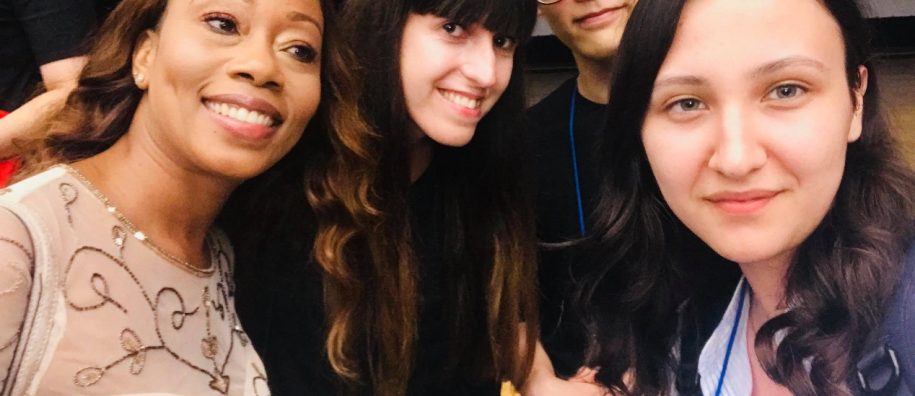
July 9-27th, 2018, MRU Communication Institute Lecturer Gintarė Gulevičiūtė presented a series of lectures on Digital Marketing and Social Media at Korea's Dongseo University (DSU) in Busan. The lectures were held as part of the "Asia Summer Programme 2018" held at DSU. She was one of 40 lecturers at the Summer School, and the only one from Europe. Gulevičiūtė was joined at DSU by 2 MRU students and MRU doctoral student Keisha LaRaine Ingram.
Gulevičiūtė said she was surprised how safe she felt in Korea and by the diligent, curious, hardworking Korean students that she taught.
She writes that the technologically ultramodern universities want to be as open, available and democratic, as well as implement the most highest teaching and research quality standards. The studies are very high level and the lecturers, administration and students are all oriented towards equality. Even the University Rector stood out and was welcoming and just as warm to lecturers and to students alike. Events, lunch meals, and dinner were always organized in one facility for all.
Regarding quality, South Korea's universities have possibly overtaken autos in terms of their reputation. While Detroit is still fighting with manufacturers from Europe, Japan and the U.S. on an uneven playing field, the academic community is closer to "Samsung's" success story. I was able to become convinced of this, Gulevičiūtė said, during the summer of 2018 in July, when I was a lecturer at DSU's summer school.
Gulevičiūtė's Impressions Of DSU and Busan:
DSU is located in Busan, Korea's 2nd largest city. It hosts up to 1-million tourists during the summer months. Busan has more than 3-million inhabitants.
We were greeted at the student village by damp air and the hot summer temperatures here. During the programme, we had the opportunity to visit many places of interest, beaches, shrines and temples. Despite that it is a highly populated city, I was able to find fantastic places near the sea, which didn't have a single tourist.
Diligent Students
The Summer School drew more than 400 participants from various parts of Asia including: China, Thailand, Singapore, and the Philippines. Universities participating at the Summer Program included: the University of Malaya (Malaysia), Petra Christian University (Indonesia), Josai International University (Japan), Guangdong University of Foreign Studies (China), Singapore University of Social Sciences (Singapore), Bangkok University (Thailand), Daffodil International University (Bangladesh), Bicol University (Philippines), Mykolas Romeris University (Lithuania) and Norton University (Cambodia). Together the universities sent 40 professors to DSU to teach 37 English-language courses over the three-week period.
The students I taught from Asia were especially diligent, curious and hardworking. However, this is what I thought I would find knowing that Asian students are known for their competitiveness at universities. It is difficult to gain admission to universities as well as to win a place in supplementary programmes or to attend Summer Schools or other events. So, students that wanted to take part in the Summer programme had to overcome many hurdles in their universities and win a competition or scholarship.
I have already visited China, so I did not experience a huge cultural shock in South Korea. Of course, I had to get used to three main differences. The first was rather short people, wherever I went. Also, as a European, I drew interest wherever I went, because I was the only lecturer from Europe. At times, it was hard to get by without Korean language skills. Only a few people I met in the city could speak English. However, due to quick and reliable Internet, I was able to get around in Busan quite easily. It was actually easier to travel around than in China, because in South Korea most metro signs and tourist places were listed in English.
When I was getting ready to visit South Korea, I had questions about how safe the country actually is. However, during my entire 3-weeks in Korea, I felt absolutely safe. Even if you get lost, you can be sure that a native Korean will guide you to your destination or the metro, or call a taxi for you, if you show a picture of where you want to go.
Busan is a popular tourist destination, so safety here is assured. Only later did I realise that those asking about how safe Korea was, were actually referring to North Korea.
Korea's big cities although large, don't wear you out and there is not much traffic or congestion on buses or the metro. When you get on public transportation, you'll usually find a place to sit down. Koreans are friendly, the food is great and delicious and often spicy, which is how I like it.
My visit to South Korea and Busan left the best impression possible and a desire to return.